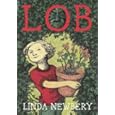
LOB tells the story of Lucy, a young girl who has a special relationship with her grandfather, from whom she learns her love of gardening. She also shares a secret with her grandfather; Lob. Lob is a green man who helps out in the garden, filling up watering cans and removing slugs and snails. He stays where he is needed the most and is glimpsed but not fully seen, only by those exceptional few who really believe. Lucy and her Grandfather are just two of these people. When Lob is no longer needed he wanders the roads, scattering seeds and helping things grow as he searches for his next special place to stay.
LOB is a gentle, effortless read, yet despite this, the story is intertwined with some difficult issues for young children, which Newbery deals with very sensitively and appropriately for the intended audience, including the death of a loved relation and the destruction of our green spaces through urban development. Whilst driving the story forward these issues however do not in any way mask the main thread of the book, which is the story of Lob, the magical Green Man. It is an enchanting story which engaged me from the outset and despite the sometimes sad elements, it is an uplifting book, beautifully written and accompanied by the charming illustrations of Pam Smy.
You do not have to be between the ages of 5-7 to read and enjoy it. It is for anyone and although some of the issues would have been too much for my three year old I did share with her, in my own words, the story of Lob, the Green Man, an idea she was enchanted by. So if you are looking for a book to inspire you before spring and give you a little nudge back out into the garden, this will have you shaking out your gardening gloves and rushing to the garden centre for a packet of seeds.
Linda Newbery was also kind enough to answer some of my questions about LOB, the answers to which you can read below.
- The idea of a magical green man helping out in the garden is very appealing. What inspired you to create the character of Lob?
In my mind this man became associated with a poem by Edward Thomas which I knew well: LOB, in which the Lob-figure is a conflation of traditional figures – Herne the Hunter, Jack-in-the-Green, the Green Man, Lob-lie-by-the-fire – walking through the countryside in various guises throughout time. The man I saw seemed to be a kind of emblem of the slow pace of country life, growth, the rhythm of the seasons, alongside the rush and busyness of workday traffic; he might have walked like that a hundred years ago, or six hundred, or hundreds of years into the future. Soon I began dreaming about Lob, and knew that a story was on its way.
- The book raises a number of difficult issues for young readers in a very sensitive way, from dealing with the death of a loved relation, to looking at how our green areas are being destroyed by urban development. Had you decided to write a book which touches on these issues before you developed the story or did they arise as you wrote the story?
- You are obviously a keen gardener yourself. Is this a passion developed in your childhood or is it something you came to later?
- What is your favourite place in your garden?
 There’s an arbour where I can sit reading or writing – in the top corner of the garden, out of sight of the house. On the fence there I have a Green Man carving. I promised myself that if I got a contract for LOB I would commission a carving from a local stonemason, and I found the perfect craftsman – Bernard Johnson – to make it for me. I can look at my Green Man from the desk in my hut, and he’s acquired a superstitious importance to my writing.
There’s an arbour where I can sit reading or writing – in the top corner of the garden, out of sight of the house. On the fence there I have a Green Man carving. I promised myself that if I got a contract for LOB I would commission a carving from a local stonemason, and I found the perfect craftsman – Bernard Johnson – to make it for me. I can look at my Green Man from the desk in my hut, and he’s acquired a superstitious importance to my writing.- The relationship between Lucy and her Grandfather is an important one in the book. Is this reflective of your own relationship with a Grandparent?
- I love the idea of someone walking along the roads, scattering seeds as they go. Have you ever sprinkled seeds or planted something somewhere secretly to cheer up a roadside or bring a bit of greenery into an otherwise grey area?
- Although Lucy’s story and the loss of her Grandfather was too old to share with my three year old daughter I did share the story of Lob with her and she was enchanted with the idea. With the lovely illustrations of Pam Smy I think the more simplified story of Lob could easily capture the imagination of toddlers and be turned into a beautiful picture book. Is this something you would consider in the future?









What a great post Garden mum, a lovely review of what sounds to be a worthy book and a well written interview, I'm in awe.
ReplyDeleteLoved all, onwards and upwards, thumbs up :)